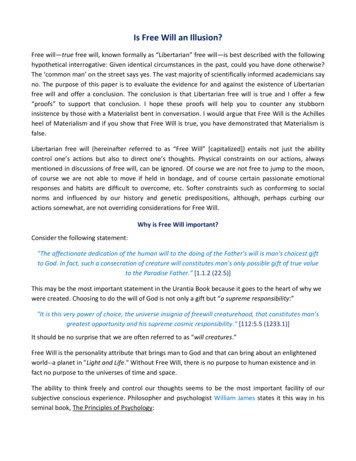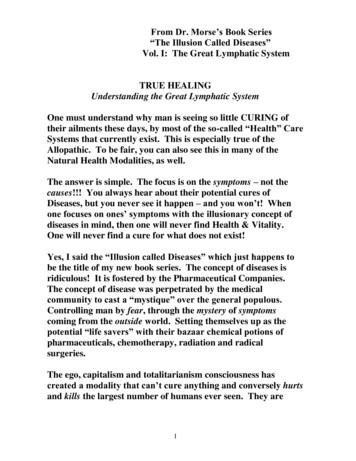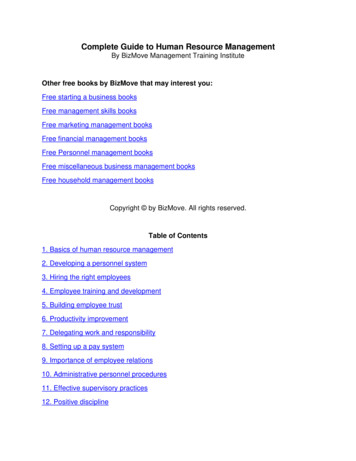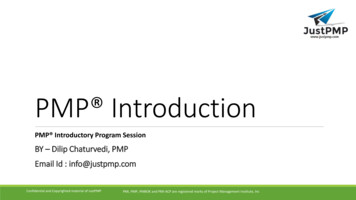
Transcription
Is Free Will an Illusion?Free will—true free will, known formally as “Libertarian” free will—is best described with the followinghypothetical interrogative: Given identical circumstances in the past, could you have done otherwise?The ‘common man’ on the street says yes. The vast majority of scientifically informed academicians sayno. The purpose of this paper is to evaluate the evidence for and against the existence of Libertarianfree will and offer a conclusion. The conclusion is that Libertarian free will is true and I offer a few“proofs” to support that conclusion. I hope these proofs will help you to counter any stubborninsistence by those with a Materialist bent in conversation. I would argue that Free Will is the Achillesheel of Materialism and if you show that Free Will is true, you have demonstrated that Materialism isfalse.Libertarian free will (hereinafter referred to as “Free Will” [capitalized]) entails not just the abilitycontrol one’s actions but also to direct one’s thoughts. Physical constraints on our actions, alwaysmentioned in discussions of free will, can be ignored. Of course we are not free to jump to the moon,of course we are not able to move if held in bondage, and of course certain passionate emotionalresponses and habits are difficult to overcome, etc. Softer constraints such as conforming to socialnorms and influenced by our history and genetic predispositions, although, perhaps curbing ouractions somewhat, are not overriding considerations for Free Will.Why is Free Will important?Consider the following statement:"The affectionate dedication of the human will to the doing of the Father's will is man's choicest giftto God. In fact, such a consecration of creature will constitutes man's only possible gift of true valueto the Paradise Father." [1.1.2 (22.5)]This may be the most important statement in the Urantia Book because it goes to the heart of why wewere created. Choosing to do the will of God is not only a gift but “a supreme responsibility:”"It is this very power of choice, the universe insignia of freewill creaturehood, that constitutes man’sgreatest opportunity and his supreme cosmic responsibility." [112:5.5 (1233.1)]It should be no surprise that we are often referred to as “will creatures.”Free Will is the personality attribute that brings man to God and that can bring about an enlightenedworld--a planet in "Light and Life." Without Free Will, there is no purpose to human existence and infact no purpose to the universes of time and space.The ability to think freely and control our thoughts seems to be the most important facility of oursubjective conscious experience. Philosopher and psychologist William James states it this way in hisseminal book, The Principles of Psychology:
“The pursuance of future ends and the choice of means for their attainment are the mark andcriterion of the presence of mentality in a phenomenon.”The late Charles Krauthammer commented that you can distinguish a realist from an idealist by askingif they believe in the arrow of history. This idea of progress, not just the acquisition of knowledge andthe development of material artifacts to simplify our lives, but also progress toward a set of high moralprinciples, grew out of the Enlightenment. It is sometimes expressed as the “perfectibility of man” aterm derived from Jean Jacques Rousseau.Metaphysical Materialism also commonly referred to as “Physicalism” and closely related to“Naturalism,” permits neither objective moral values nor Free Will. Therefore, there can be no fixedtarget for an arrow of history to be aimed at and no force to set it airborne toward a chosen target.Moral progress towards truth, beauty and goodness, it would seem, can only be affected by thecollective Free Will of a civilization. In fact the concepts of good and evil become meaningless withoutFree Will. Even if a secular society were to agree on what is right and what is wrong, there would be nopoint to the distinction were it the case that we were entirely determined by computational processesin the physical brain.That we have Free Will has been an underlying assumption of all human cultures. Justice is predicatedon the assumption of Free Will. The ability to reason presupposes Free Will; if we cannot direct ourthoughts how can it be said that we have the ability to reason?The importance on accountability and justice of Free Will is critically important to understand. Howdamaging to society would it be were New Atheist neuroscientist Sam Harris’s comment below tobecome widely accepted?“How can we be free as conscious agents if everything that we consciously intend is caused byevents in our brain that we do not intend and of which we are entirely unaware? We can’t.”“Either our wills are determined by prior causes and we're not responsible for them or they are theproduct of chance and we're not responsible for them.”Recent experiments reported in Florida State Philosopher Alfred Mele’s book entitled, Free Will, WhyScience has not Disprove Free Will show that once one learns that Free Will is an illusion they are morelikely to cheat.A more profound indictment of metaphysical Materialism itself, which denies Free Will, can be madeby looking at the events of the 20th Century. The genocide for the Armenians by the secular YoungTurks, the atrocities in China by Imperial Japan, the Gulags and great terror and the UkrainianHolodomor by Soviet Russia, the Nazi Holocaust, Mao’s Great Leap Forward and Cultural Revolution,the unknown atrocities in Communist North Korea and Viet Nam. All principle figures were secularistswho embraced metaphysical Materialism.
"During the first third of the twentieth century Urantians killed more human beings than were killedduring the whole of the Christian dispensation up to that time. And this is only the beginning of thedire harvest of materialism and secularism; still more terrible destruction is yet to come."[195:8.13 (2082.5)]WHAT IS THE CURRENT VIEW AMONG SCIENTISTS AND PHILOSOPHERS OF MIND?If the hope of humanity rests at least in part on the presumption of Free Will, and if the ‘common man’on the street believes we have Free Will and given that we all behave as though we have it, why thendo the vast majority of neuroscientists, about 98% according to Professor of Cognitive Sciences DonaldHoffman, of the University of California Irvine insist that Free Will is an illusion?I can offer a couple of reasons. There are some scientific experiments that seem to support the notionthat we are programmed to act unconsciously. These experiments show that actions precedeconscious awareness. I will discuss these in the next section. For the moment I can say that a principlereason Free Will is almost universally denied in academic circles is because Western intellectuals havewholeheartedly embraced metaphysical Materialism which adopts determinism—necessary causes—as its primary category of cause and therefore denies the creative causes of agency—Free Will. And thetrend toward Materialism seems to be increasing since the Enlightenment. Christian Apologistphilosopher William Lane Craig describes this in a lecture:“The reason for the dominance of determinism is physicalism or materialism. They do not believethat there is a mind or a soul distinct from the body. If you are not a dualist with respect to mindand body then you are going to be stuck with determinism.”Furthermore, another common stumbling block for many scientists who admit that there are reasonsto doubt that science can explain all aspects of reality is that they just don’t know what to do with theidea of an immaterial, pre-existent Creator because it is not subject to scientific investigation. This isclear in this exchange between physicist Sir Roger Penrose and Christian Philosopher William LaneCraig. Craig commenting on Penrose’s admission that the mental world—mind—constitutes a distinctcategory of reality, follows with this:Craig: “Now we're beginning to add a little more content to this notion as the Creator. This mindwould have to be uncaused timeless, spaceless, immaterial enormously powerful in order to causethe ethical realm. It would have to be good, perfectly good. And to cause the mathematical realm itwould have to be omniscient and so we're winding up I think with a very rich theological ultimate.”Penrose: “[Reality] has those three platonic aspects [mind, mathematics and the physical] and onecan extend the idea of the truth if you like which is perhaps the mathematical part of me and of theplatonic notions and to the other three as well but I guess that my problem is that it [the idea of aCreator] is just, I said this before, it's just too vague to know what to do with it you can'tinvestigate it it's hard to know what to do with it.”
Materialism is often contrasted with Idealism. In this contrast Idealism proposes a pre-existentconscious and minded entity—a Deity—that gives rise to material reality. So whereas, in Idealism, preexistent mind gives rise to matter; in Materialism, mind is derived from matter.The claim of metaphysical Materialism is that all that exists are material particles and forces applied tothem. Further, Materialism claims, that the universe is deterministic—a magnificent state machine—initiated at the big bang and based on fixed physical laws. The configuration of particles at each instantin time is determined by the position of particles and the forces applied to them at the precedinginstant in time, and that preceding instant was determined by the prior instant and so on all the backto the initial conditions of the big bang. Therefore, each successive instant in time is determined by thearrangement and forces of the current instant and so on moving forward to the future.If everything is determined by the prior chain of causation and if the universe is causally closed thenthere is no room for Free Will, or so it would seem. Berkeley philosopher John Searle, well known forhis ‘Chinese Room’ rebuttal to the ‘strong’ artificial intelligence ‘Turning Test,’ puts it this way:“The problem is: Is it the case, for every decision that I make, that the causes, the antecedent causesof that decision, were sufficient to determine that very decision? If they are, we have no free willand it's an illusion.”Aside from the brute acceptance of Materialism by academics, the operational assumption of researchscientists is “methodological naturalism” which holds that science can only introduce physical causesinto their methods. This methodological preference has gradually transformed into “ontologicalnaturalism,” the belief that only physical (natural) things and causes actually exist.In philosophy there is a problem in epistemology, the study of knowing, called the “Infinite Regress”problem. Were your beliefs to be subjected to a Socratic session asking Why continuously, eventuallyyou would have to establish a “First Principle”, i.e. a foundational assumption to halt the regress. Andthis foundational assumption what your philosophy is built upon. If the assumption is wrong, theneverything built upon it is probably at least somewhat wrong. And if it is wrong it should seem wrongwhen subjected to reason. The denial of Free Will is one such thing that seems wrong.In the philosophy of science, that first principle has become “Materialism” or “Naturalism” or“Physicalism.” Whatever you want to call it what it means is that the Universe is comprised one thing(matter and the forces) described in the Standard Model. The existence of one thing is a monisticrather than a dualistic philosophy.Here is a sampling of the currently accepted view:Francis Crick co-discoverer of the DNA code and author of the book The Astonishing Hypothesis, states:“You, your joys and your sorrows, your memories and your ambitions, your sense of identity andfree will, are in fact no more than the behaviour of a vast assembly of nerve cells and theirassociated molecules.”
Harvard professor Steven Pinker says there is no way to make sense of a spirit or soul:“I don't believe there's such a thing as free will in the sense of a ghost in the machine a spirit or soulthat somehow pushes buttons and pulls levers of behavior. There's no sense that we can make ofthat. I think our behavior is the product of physical processes in the brain.”The denial of Free Will is nothing new. Friedrich Nietzsche in the book Beyond Good and Evil referredto Free Will as a “folly” resulting from the extravagant pride of man, a crass “stupidity.” His criticism ofChristianity rested largely on his denial of Free Will.Arthur Schopenhauer called Free Will an “illusion” in his paper, Freedom of the Will presented to theNorwegian Society of Sciences:“You can do what you will, but in any given moment of your life you can will only one definite thingand absolutely nothing other than that one thing.”Free Will is the central problem of philosophy and the biggest mystery according to renowned Berkeleyquantum physicist Henry Stapp as stated in an article entitled, Philosophy of Mind and the Problem ofFree Will in the Light of Quantum Mechanics:“The central problem in philosophy of mind is the mind-body problem: The problem of reconcilingour science-based understandings of the causal structure of the physically described world,including our bodies and brains, with the apparent capacity of our conscious thoughts and efforts tocause our bodies to move in consciously intended ways.”Philosopher of mind Galen Strawson views the question of free will as the most dramatic irresolvableclash in philosophy:“I would say that there is a fundamental sense in which free will is impossible and it doesn't makeany difference whether the world is determined or not. At the same time, I think we can't helpbelieving we've got it. It's perhaps the most dramatic irresolvable clash in the whole of philosophy.”John Searle has called Free Will a “scandal” and goes on to say:“I can't see that we have made any advance [in understanding free will] in the past, let's say hundredyears or even a couple of hundred years, over what went on in the previous history of philosophy.”It seems there is an impasse: On the one hand is the strong sense we all have that we can do as wewish and on the other hand is the consensus view of science that the physical universe is deterministicand causally closed. And since we are part of that universe, so too are we subject to determinism.Notre Dame Philosopher Peter van Inwagen expresses exasperation with the problem of free will:“I have tried to work on this problem [free will] to find the place that allows both free will andmoral and responsibility in a world that is certainly either deterministic or indeterministic, for morethan 40 years now, and I confess myself just baffled; it is just too difficult for me.”
Many, if not most philosophers of mind, have ceded authority on this topic of Free Will to theneuroscientists and accepted that the mind is the brain and that it is computational. Computationalprocesses, they believe, account for all thought as well as consciousness itself. These computationalprocesses of the physical brain result in the emergence of what we experience as our subjectiveconscious experience.Consciousness is viewed as an “epiphenomenon” by most philosophers of mind according to Universityof Arizona anesthesiologist, Stuart Hameroff. It is a byproduct that arises but has no agency—it is readonly in computer parlance. We are “helpless spectators” as T.H. Huxley has said.According to Searle, many philosophers of mind believe that the issue of free will has been resolvedthrough a range of theories referred to as “compatibilism:”“I should tell you most philosophers think this problem [free will] has been solved by something theycall ‘compatibilism’ which says well, really, if you understand what these words mean you'll see thatfree will and determinism are really compatible.”Compatibilism is an attempt to make free will compatible with determinism. It is therefore a way ofresolving the impasse between our personal perceptions about free will and the scientific consensus.However, even if you are able to make sense of compatibilist’s explanations and even if you are able toignore the clear contradictions in their descriptions, with little more than a cursory investigation, one isleft with the clear impression that compatibilism is nothing more than a way of redefining free will asdecision making. John Searle and many others agree:“[Compatibilists content that] To say that you have freedom is just to say you're determined bycertain sorts of causes such as your desires instead of somebody putting a gun at your head. I justthink that's a cop out; compatibilism just evades the problem.”It seems that compatibilists attempt to resolve the Free Will problem by equivocation using the term“decision.” The method is like a parlor game where compatibilists, most of whom subscribe to someform of the computation theory of mind, conflate decision making in the computational sense with thedecisions we make in everyday thought which entail creative choices. The two are not the same; theyare nearly opposites of one another. The former use of the term decision is algorithmic; the latter useof decision is creative.To demonstrate the incoherency in compatibilism, let me turn to Philosopher Daniel Dennett. Dennettis a well-respected thinker in the area of consciousness, free will and compatibilism and counts himselfas one of the “Four Horsemen” of the New Atheist Movement. Dennett is a vocal advocate of what hasbecome known as an “Ultra-Darwinism”—holding to a strict interpretation of the Modern Synthesis(Neo-Darwinism). He believes that the mind represents the programming of the human brain throughNeo-Darwinian processes. Here are some of Dennett’s comments on free will and determinism:“What evolution has done is designed organisms that do a little bit of avoiding. And there's been anarms race and the avoiders have become cleverer and cleverer on how you avoid something. Youavoid something by anticipating it and then taking corrective measures right. The simplest case an
incoming brick. You see it and duck to avoid it. You say well you see I avoided that incoming brick.Well was it ever really going to hit you? No, because the light bounced off the brick into your eyes,you saw it in time so that you ducked. So suppose you were determined to duck? Well then the brickwas never going to hit you was it? It just seemed as if it was going to hit you What we have tounderstand is that free will is our capacity to see probable futures; futures that seem like they'regoing to happen in time to take steps so that something else happens instead.” [My emphasis]I do not find Dennett’s explanation at all insightful or correct. His claim is that this ability to “seeprobable futures” and “avoid” them all (ducking when a brick flies toward them) comes courtesy ofNeo-Darwinian programming and further he claims that it constitutes free will “where it counts.”Dennett’s primary error is in drawing a false analogy between the programming of a computer by ahuman and the programming that could result from Neo-Darwinian evolution. There is an importantdifference. Evolution by Neo-Darwinian processes occurs for a specific moment in time under veryspecific physical conditions in the brain relating to survival. A fundamental attribute of evolution is thatit is non-directional, it has no target, it can therefore, have no foresight. But human programmingalways utilizes foresight. Computers are programmed to apply general principles to a wide variety ofspecific cases using the concept of variables. Programming by the naturalistic processes of evolutioncan only be specific to the conditions at the moment.The neurological spike train from the eye to the optic nerve that results, from seeing a falling rock oran incoming brick that somehow leads to a cascade of unconscious events in the brain causing theperson to duck, is specific to that single instant. There can be no naturalist mental mechanism thatcould parse out those specific events in the brain to analyze them and apply them to generally similarcircumstances in the future; that would be foresight. To believe that evolution can do such a thing isnonsense. Dennett’s suggestion presupposes an agency with foresight.Quantum Mechanics and IndeterminismIf Materialism is true and given that Materialism necessitates determinism which is incompatible withFree Will, is that the end of it? A deterministic world offers a single category of causation: necessarycauses—determinism. Are there other causes? What about the contingent causation given by theindeterminacies of quantum mechanics (also here). You might be wondering why modern philosophersof mind and neuroscientists believe in a deterministic universe and further that our minds are subjectto that determinism. After all, determinism is an attribute of the old Newtonian Classical Physics. AndClassical Physics has been superseded by the probabilistic indeterminacies intrinsic to quantummechanics, right? Couldn’t these quantum mechanical indeterminacies be pressed into service torescue Free Will? I think this question is the most important question in the nexus interconnectingmodern philosophy, science and religion. However, physicists have assured neuroscientists for decadesthat the actions of the neurotransmitters across a neuron’s synaptic cleft—the actions that arepresumed to be the cause of consciousness and thought—are too large to be influenced by theindeterminacies of quantum mechanics. Stuart Hameroff in this lecture claims that that assurance is
now known to be false and counters the claim that “everyone knows that the brain is too warm andwet and noisy for delicate quantum effects” with the following remarks:“A couple experiments proved them wrong. If you do quantum spin [experiments] through thebenzene rings, which are the basis for all organic chemistry, you get quantum spin transfer which isincreased by temperature (Ouyang & Awschalom (Science 301:1074-78, 2003). And then it was [also]discovered that photosynthesis in plants collects photons and transports the energy through multiplepossible pathways simultaneously superposition [quantum mechanical superposition] of all of allpathways by these PI resonance rings.”Nevertheless, despite the debate about whether or not quantum effects can operate in the brain, itseems that if we have Libertarian Free Will, quantum mechanics must somehow play a role.Philosopher John Searle agrees:“It is tempting, indeed irresistible, to think that the explanation of the conscious experience of freewill must be a manifestation of quantum indeterminism at the level of conscious, rational decisionmaking .[However,] if quantum indeterminism amounts to randomness, then quantum indeterminism, seems useless in explaining the problem of free will because free actions are not random.”Substance DualismLibertarian Free Will is by nature dualistic. There are two forms of dualism: Property Dualism andSubstance Dualism. Property dualism is purely physical—Materialistic; mental properties such asconsciousness arise from the physical activities of the brain; they just have properties that are differentfrom the physical substrate that gives rise to them. Substance dualism invokes an immaterialconsciousness or soul that interacts with the physical brain.Substance dualism implies interactionalism; interaction between these two substantially differenttypes of things—mind and brain. But interactionalism conflicts with the Materialist conviction that thephysical universe is causally closed. And for this reason, and because Materialism is so entrenched inthe academy, according to neuroscientist Donald Hoffman, no self-respecting neuroscientist todaybelieves in Libertarian Free Will:“The theories of free will are: determinists, compatibilists and libertarians. [Libertarianism holds]that free will somehow rises above the plane of cause and effect of the physical world [and it is apoint of view that] no self-respecting neuroscientist or philosopher takes. It's not among academicsa credible view partly because it's dualist.”The Urantia Book view of the mind, personality, adjuster and the soul, interacting with the physicalbrain would fall into the category of substance dualism as it entails a transcendent immaterial mindPersonality and Will interacting with the physical brain.“Human consciousness rests gently upon the electrochemical mechanisms below and delicatelytouches the spirit morontia energy system above.” [111:1.5 (1216.6)]
Before leaving this section to discuss the evidence for and against Free Will, it is important to point outthat as long as the indeterminacies of quantum mechanics are accepted as they are in the mostprevalent view—the Copenhagen interpretation—it cannot be said that science has ruled outLibertarian Free Will because the universe is not deterministic. The indeterminacies of quantummechanics are demonstrated by the fact that identical particles, in identical conditions, behavedifferently according to Berkeley physicist Richard Muller in his book, Now, The Physics of Time:“The philosophers’ key assumption that the past completely determines the future is not supportedin modern physics. Their arguments that free will does not exist were based on a false premise. Wecannot conclude that free will exists, but we can conclude that nothing in science rules it out.”
WHAT IS THE EVIDENCE AGAINST FREE WILL?If Materialism is true, then determinism is true where it counts for the mind-brain problem. And ifdeterminism is true, then Libertarian Free Will is false. Therefore much of the evidence against FreeWill is evidence showing that the mind is reducible to the physical brain. If scientists can show that thephysical brain accounts for all of our conscious experience then they have also shown that Free Will isan illusion. Neuroscientists believe they have demonstrated this using a variety of techniques involvingthe monitoring of brain activity with fMRIs and EEGs, stimulating the brain and perturbing the brain.There are other common observations as well that at first thought appear to support the notion thatthe mind is reducible to the physical brain.Mind / Brain Correlations - Phineas GageIn talking about the effects of brain on thought, you can always expect the name of Phineas Gage to beentered into the discussion. As Wikipedia describes it:“Phineas P. Gage (1823–1860) was an American railroad construction foreman remembered for hisimprobable survival of an accident in which a large iron rod was driven completely through his head,destroying much of his brain's left frontal lobe, and for that injury's reported effects on hispersonality and behavior over the remaining 12 years of his life—effects sufficiently profound (for atime at least) that friends saw him as ‘no longer Gage.’” The article goes on to say that “Gage'sphysical and mental condition shortly before his death implies that his most serious mental changeswere temporary.”In my view, the most interesting thing about Gage’s case, as it relates to Materialism’s claim that themind is the brain, is not that his behavior was affected, but that its effects were relatively minor andshort lived. Phineas was still a conscious living human that could carry on about his work albeit withless civility and decorum as usual. A Materialist should find it remarkable that Phineas would have anymental capabilities at all given the severity of the injury. After all, if the brain is all there is, and if it is afine-tuned machine programmed over millions of years of evolution, we should expect that any severeaberration would destroy the delicate operation of what would have to be a large number of veryspecific electro-chemical interactions.Mind / Brain Correlations - Neuroscience ExperimentsThere are three categories of correlations that come about from neuroscientist’s research: Recording,Stimulation, and Lesion according to Gary Schwartz professor of psychology, medicine, neurology,psychiatry and surgery at the University of Arizona. Neuroscientists Record brain activity usingelectronic equipment such as EEG and fMRIs to show that brain activity is associated with specificsensory objects. They stimulate various areas of the brain using electrodes or magnetic coils to inducevarious visual sensations. Neuroscientists can even remove various regions of the brain to show thereis a loss of specific capabilities—lesion. There is no question that this research shows that effects onthe brain affect our mental experience and that our mental experiences are correlated with specific
regions in the brain. However, no substance dualist would claim that the brain does nothing and itshould always be remembered that correlation is not causation.Schwartz points out that these three techniques—recording, stimulation, lesion—would apply toelectrical engineers who could demonstrate these same types of correlations with television sets.Electrodes can be placed on specific components in TV circuits and monitor the visual images on thescreen. They can stimulate selective components of a TV using electrodes placed inside the TV set ormagnetic coils placed outside a TV to stimulate specific circuits to replicable patterns seen on the TVscreen. Finally, Schwartz points out, that electrical engineers can remove various components from theTV to affect the visual images on the screen. There are a number of other analogies, radio, piano thatcan be brought to bear showing that correlation is not causation.My view is that all this research attempting to establish correlations between our mental phenomenonand brain activity does not provide much additional insight over what we can gain in our everydayexperience. Our thinking is clearly affected by physical conditions of the brain: Whether we had a goodnight sleep, blood sugar levels, caffeine, alcohol, medications all affect
This may be the most important statement in the Urantia Book because it goes to the heart of why we . Recent experiments reported in Florida State Philosopher Alfred Mele [s book entitled, Free Will, Why Science has not Disprove Free Will show that on










